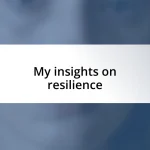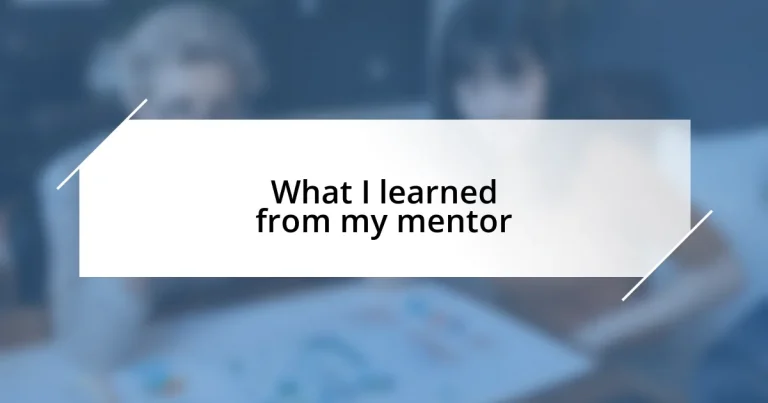Key takeaways:
- Mentorship offers valuable guidance, emotional support, and accountability, catalyzing personal and professional growth.
- Key traits of effective mentors include empathy, experience, approachability, encouragement, and integrity.
- Embracing constructive feedback transforms it into a tool for growth, fostering deeper connections and creativity.
- Sustaining mentor relationships through ongoing communication, evolving roles, and regular expressions of gratitude is crucial for long-term success.
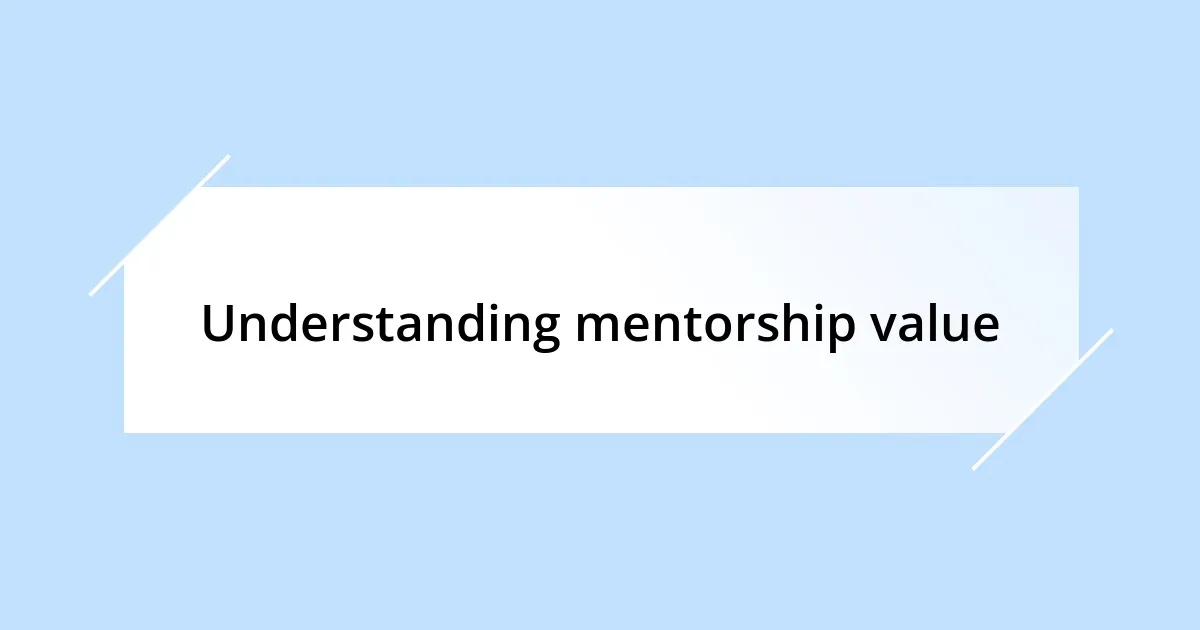
Understanding mentorship value
Mentorship is incredibly valuable because it provides not only guidance but also emotional support during challenging times. I remember a period in my career when I felt lost, questioning my choices. My mentor patiently listened to my concerns and reassured me that it was normal to feel this way, which made all the difference.
Have you ever had someone believe in you when you doubted yourself? That’s what mentorship offers—a unique perspective shaped by experience. My mentor once shared a story about a mistake he made early in his career, turning it into a teaching moment. This vulnerability helped me understand that failures can be stepping stones rather than roadblocks.
Moreover, mentorship fosters a sense of accountability. I recall setting ambitious goals with my mentor’s encouragement, knowing he would check in on my progress. That accountability pushed me to strive harder and gave me a boost of motivation I didn’t know I needed, showcasing how mentorship can catalyze personal and professional growth.
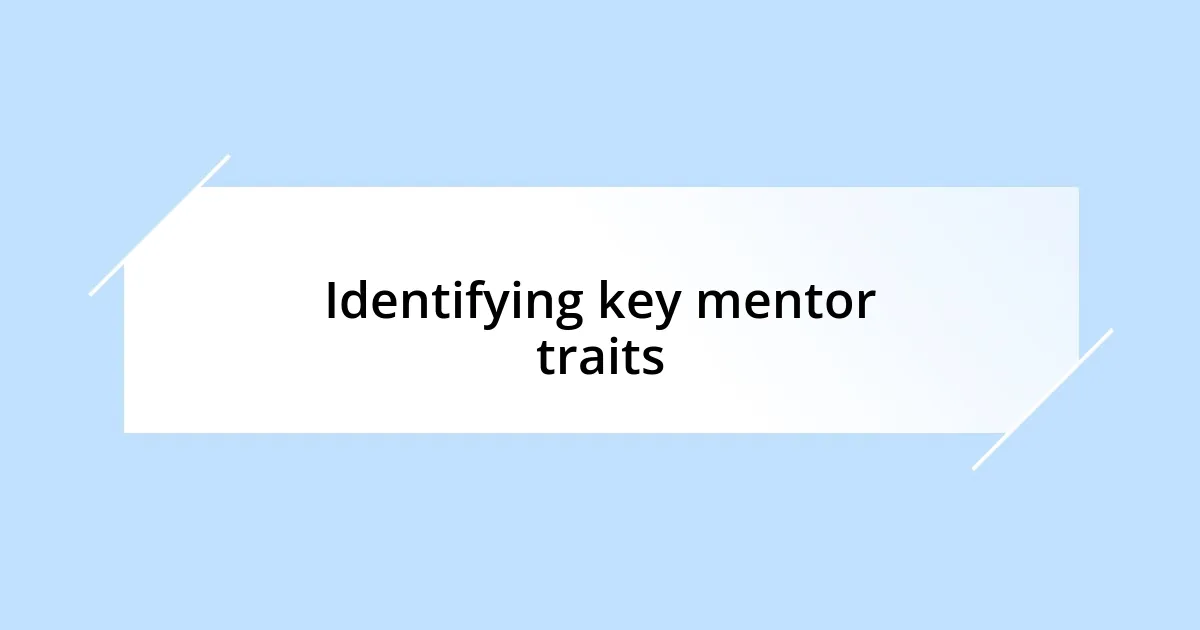
Identifying key mentor traits
Identifying a great mentor is about recognizing key traits that contribute to a productive relationship. From my experience, one crucial quality is the ability to listen deeply. When I approached my mentor with challenges, he didn’t just hear my words; he engaged with my feelings, asking thoughtful questions that led to powerful insights. This level of attentiveness made me feel valued and understood, which is essential in any mentoring dynamic.
Here are some key traits to look for in potential mentors:
- Empathy: They should connect with your feelings and experiences.
- Experience: Their background and skills should complement your goals.
- Approachability: You should feel comfortable sharing your struggles and aspirations.
- Encouragement: They should inspire you to push beyond your limits.
- Integrity: A mentor should lead by example, demonstrating honesty and ethical behavior.
In my own mentorship journey, I found that mentors who communicated openly and provided constructive feedback allowed me to grow in ways I never expected. Their candid discussions not only shaped my professional path but also instilled a sense of confidence that I carry to this day.
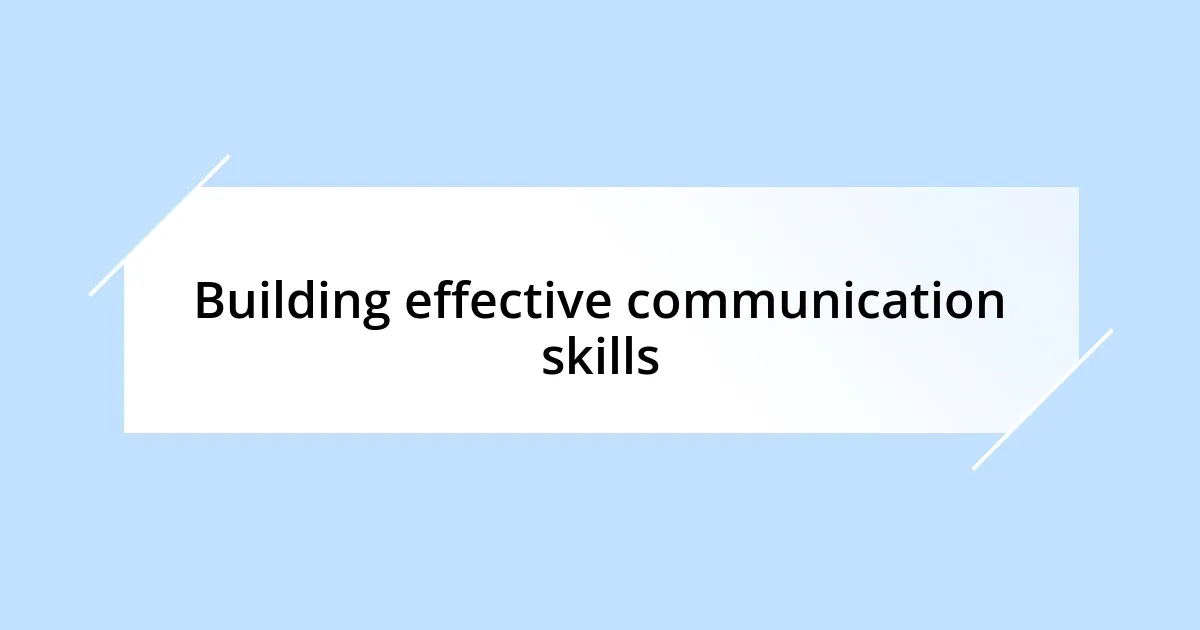
Building effective communication skills
Building effective communication skills is essential, and I’ve found that learning from my mentor dramatically improved mine. I remember sitting in our weekly meetings where he would emphasize clarity in both verbal and written communication. He often shared personal stories where miscommunication led to significant setbacks. His experiences highlighted the importance of being clear and concise, ensuring that our messages were always understood.
One key takeaway I learned was the power of active listening. When my mentor would ask for my input, he didn’t just nod along—he truly engaged with my ideas, reflecting back what he understood and asking follow-up questions. It inspired me to do the same with others. I’ve noticed that this not only fosters a supportive environment but also opens the door to collaboration and creativity, which enhances teamwork.
Another valuable lesson was adapting communication styles to fit different audiences. During one of our discussions, he pointed out how tailoring my approach could enhance understanding. For instance, presenting complex ideas differently to teammates versus clients made a significant difference in project outcomes. Overall, this adaptability has certainly enriched my interactions, making me a more effective communicator.
| Communication Skill | My Personal Experience |
|---|---|
| Clarity | Clear communication prevented misunderstandings in a crucial project. |
| Active Listening | Tuning into others’ perspectives led to innovative team solutions. |
| Adaptability | Adjusting my style for different audiences improved project success rates. |
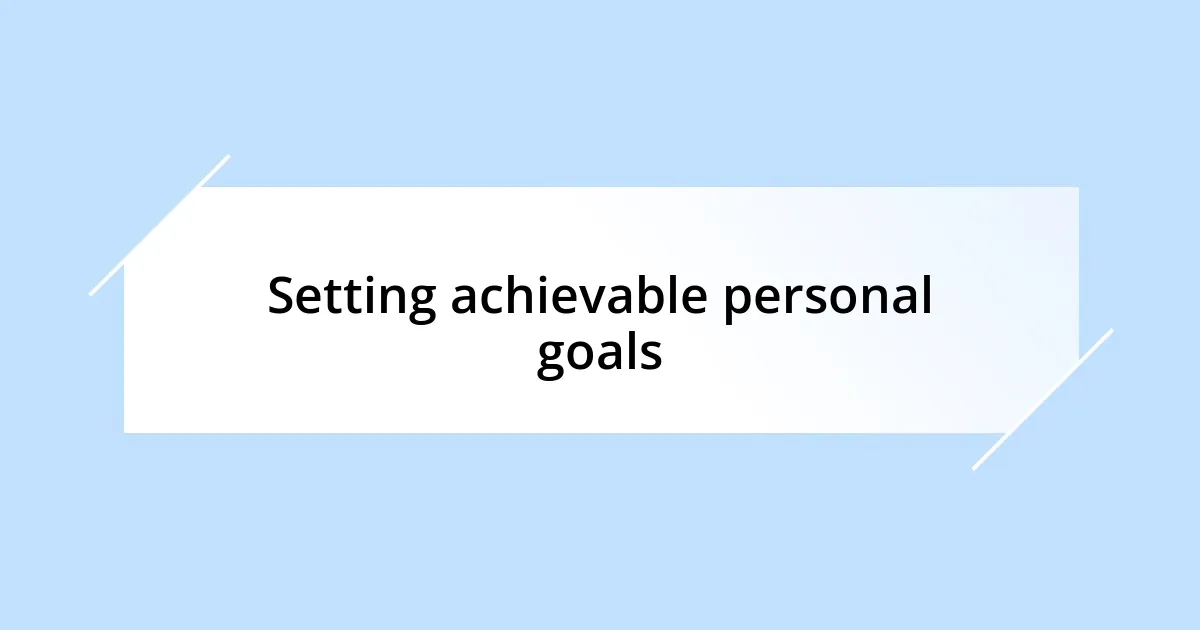
Setting achievable personal goals
Setting achievable personal goals is a skill I’ve honed over time, largely thanks to the guidance of my mentor. Early in our partnership, he encouraged me to break down my larger ambitions into smaller, manageable steps. I vividly remember feeling a wave of relief when I began to see my daunting goals as a series of bite-sized challenges instead. By celebrating small wins along the way, I developed a sense of progress that fueled my motivation.
One pivotal moment for me was when my mentor helped me set a goal to improve my public speaking skills. Instead of aiming to deliver a flawless presentation right away, we mapped out incremental steps—starting with speaking up more in team meetings and gradually working up to presenting in front of larger groups. At each stage, I could feel my confidence building, yet I also learned the value of resilience. I stumbled a few times, but reflecting on those experiences taught me resilience—a key trait I still value.
Have you ever felt overwhelmed by a goal? I certainly have. My mentor’s advice was simple yet profound: “You can’t climb a mountain without taking the first step.” This mantra stayed with me. By approaching my goals with a mindset focused on achievable milestones, I discovered that progress isn’t always about leaps, but often about the steady rhythm of consistent efforts. It’s a lesson in perseverance and clarity that has not only shaped my approach to personal goals but also nourished my overall growth.
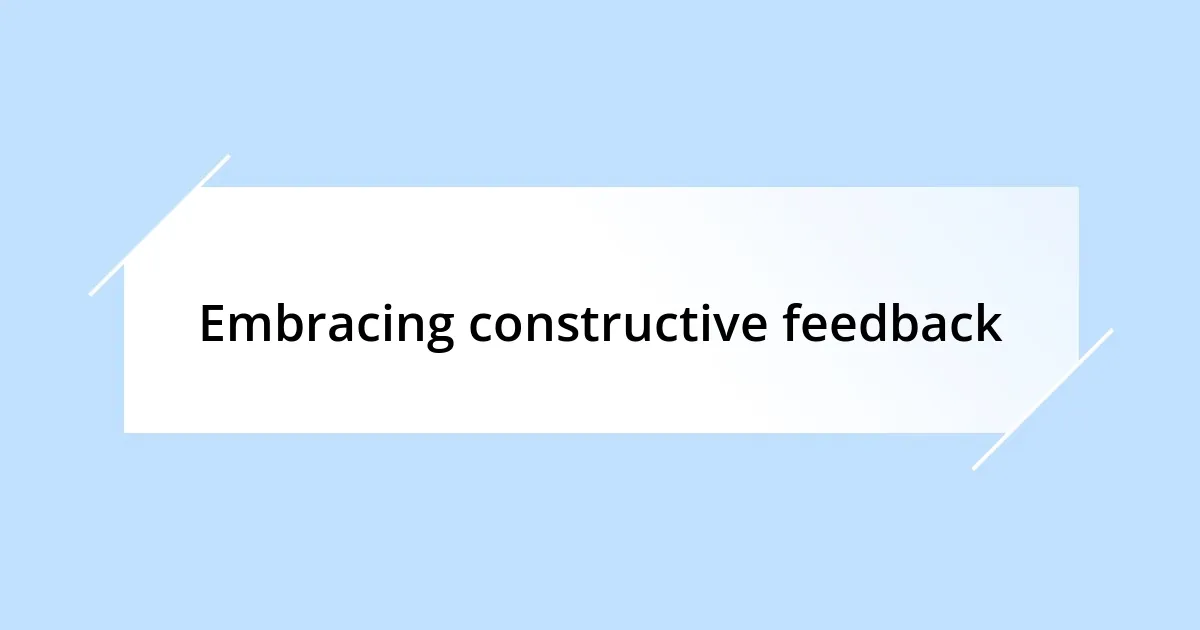
Embracing constructive feedback
Embracing constructive feedback was a game changer for me. I remember a specific instance when my mentor critiqued a project proposal I was particularly proud of. Though it felt daunting to hear his suggestions, I quickly realized his insights were aimed at my growth—not a personal attack. This moment taught me that feedback is a gift, an opportunity to refine my skills and think critically about my work.
Initially, I found it hard to separate my ego from my work. It’s natural to feel defensive when someone points out flaws. However, my mentor often reminded me that constructive feedback could spark unexpected innovation. By viewing his critiques through that lens, I started to see them as a roadmap to improvement. Have you ever had that lightbulb moment when a suggestion reshaped your approach? For me, it was during a feedback session when I realized a minor adjustment could completely elevate my project.
When I embraced constructive feedback, I also learned the importance of gratitude. Each time someone took the time to provide insight, it felt like they were investing in my journey. I began to value both the positive and the critical remarks, as they paved the way for my personal development. This shift transformed my approach to learning and collaboration, creating a deeper connection with those around me. Wouldn’t you agree that fostering an environment where feedback is welcomed and appreciated can lead to incredible growth?
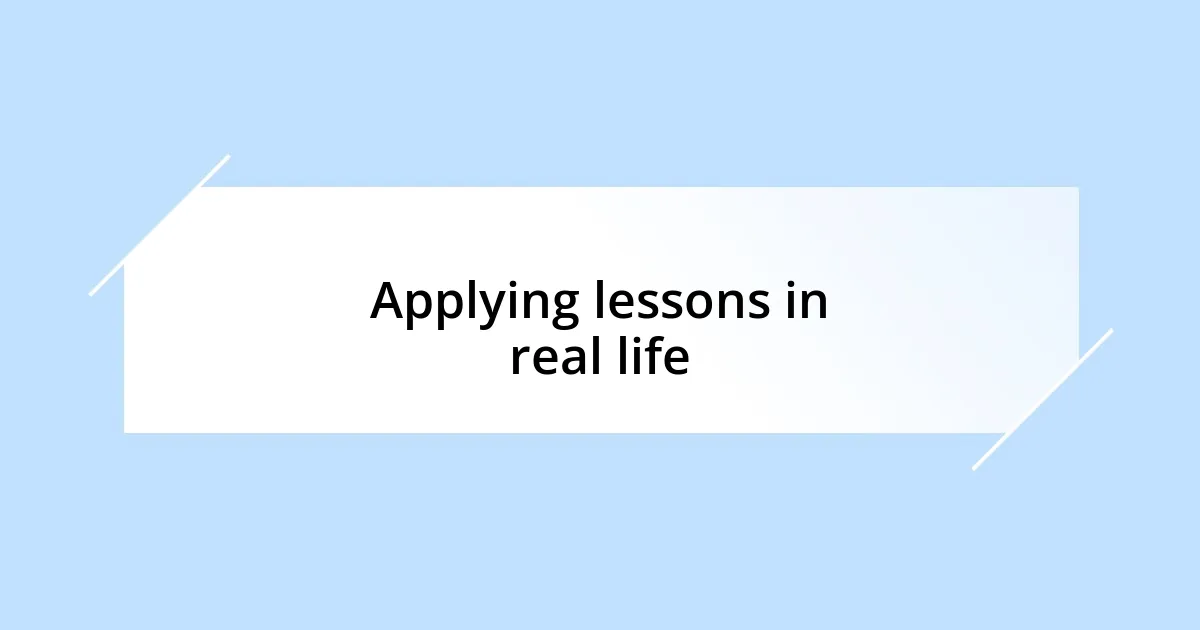
Applying lessons in real life
I’ve found that applying lessons in real life often means stepping outside my comfort zone. One memorable experience was when my mentor encouraged me to lead a team project. At first, I was hesitant, gripping my notes and worrying about every detail. But, as I put his advice about trusting my abilities into practice, I discovered a sense of fulfillment in guiding others. The thrill of collaboration surpassed my fears, and I learned that real leadership is about empowering those around you, not just managing tasks.
Another lesson that profoundly resonated with me was the importance of adaptability. I recall a challenging situation where a last-minute change derailed our project plan. Instead of panicking, I drew on my mentor’s teachings, choosing to pivot and brainstorm solutions with my teammates. This experience taught me to approach unexpected obstacles as opportunities for creativity. Have you ever faced a similar situation? I certainly have, and it opened my eyes to the excitement of navigating uncertainty.
Reflecting on these experiences, I realize that applying lessons from my mentor isn’t always about success. It’s often about the journey itself—the mistakes made and the growth experienced along the way. When I stumbled, I embraced the discomfort as a signal for learning. Now, when faced with challenges, I remind myself that being vulnerable is part of the process, making every lesson all the more valuable. Isn’t it rewarding to recognize that every setback can be a stepping stone to something greater?
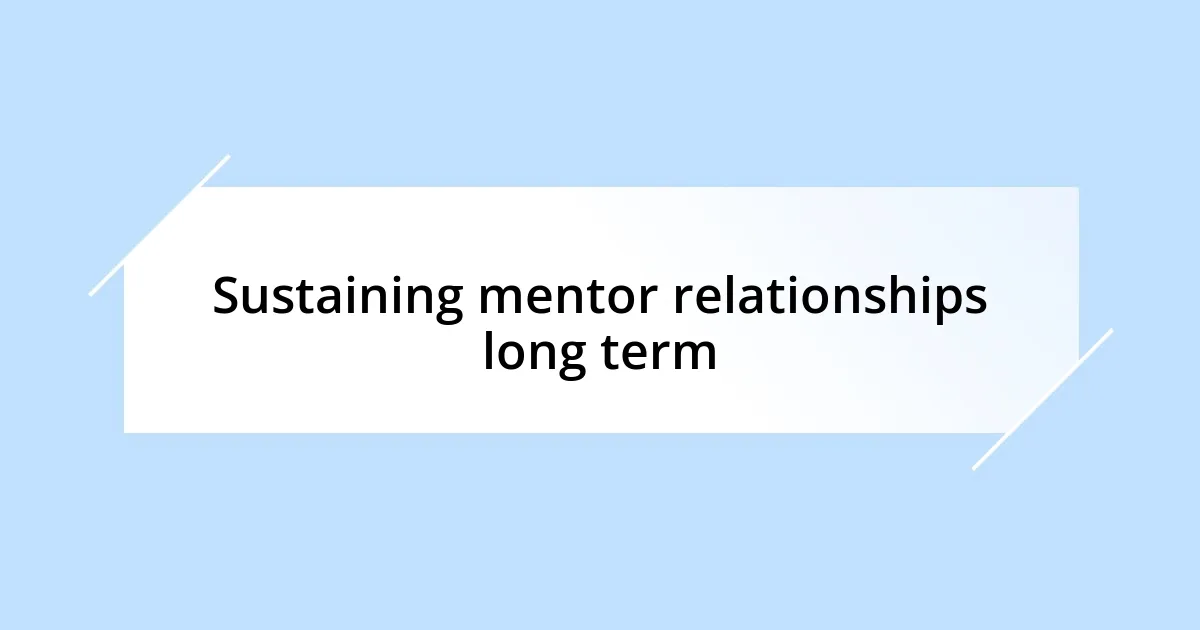
Sustaining mentor relationships long term
Sustaining mentor relationships over the long term involves ongoing communication and mutual respect. I’ve learned that checking in regularly, even just to share updates or successes, can keep the connection alive. For instance, I remember sending my mentor a short email about a new project I was excited about. His prompt response, along with a few words of encouragement, highlighted the value of staying connected.
Another key aspect is being open to evolving roles in the relationship. Initially, it was clearly a mentor-mentee dynamic, but as I gained experience, I found opportunities to share insights back with him. This shift created a more collaborative atmosphere that deepened our connection. Have you ever noticed how a relationship matures as both parties contribute? I certainly have, and it made our discussions even richer.
Finally, appreciation cannot be overstated. I make it a point to express my gratitude regularly—sometimes with a simple thank you, or occasional gestures like a handwritten note. Those small tokens go a long way in reminding mentors that their investment in us matters. How often do you acknowledge the people who’ve helped shape your journey? I believe that a little appreciation fosters a bond that stands the test of time.











